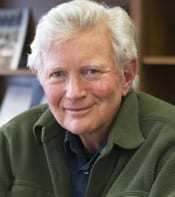Podcast: Download
Peter Gray – Why Play is the Key to Leadership, Strength, Adaptability

How much of our lives do we spend focusing on money and making sure we don’t end up as a failure?
And why is it so rare to find people who can lead their own path and easily adapt to the changes in our world?
If you’re one of those guys who is struggling to find what has you feel alive, it’s probably because you’ve forgotten how to truly play. Peter Gray Ph.D. is a research professor at Boston College that studies play. And today we’re going to find out how play is the key to leadership, innovative thinking, problem solving, and doing what has us feel alive. We’ll also talk about why our highly structured, competitive environment that’s meant to give us an advantage is actually making us weaker, depressed, and breeding us to become robots.
In this interview:
- Why play is a strength instead of a threat
- Does play mean we’ll be irresponsible failures in life?
- Why people can’t think outside of the box
- How we can become adaptive in today’s economy
- Why it doesn’t really matter what college you go to
Plus:
- How a lack of play causes depression and anxiety
- The 4 keys elements to play
- How we’re being trained to be better followers instead of leaders
- What truly makes us more brave and strong
- Why most folks just want someone to tell them what to do
 Peter Gray (born 1946) is an American researcher and scholar who is a research professor of psychology at Boston College. He is the author of a widely used introductory psychology textbook, Psychology (Worth Publishers, with co-author David Bjorklund beginning with the 7th edition),[1] now in its seventh edition. The book broke new ground when the first edition was published (in 1991) as the first general introductory psychology textbook that brought a Darwinian perspective to the entire field. He is also author of Free to Learn: Why Unleashing the Instinct to Play Will Make Our Children Happier, More Self-Reliant, and Better Students for Life (Basic Books, 2013), and he writes a popular blog for Psychology Today magazine entitled “Freedom to Learn”.
Peter Gray (born 1946) is an American researcher and scholar who is a research professor of psychology at Boston College. He is the author of a widely used introductory psychology textbook, Psychology (Worth Publishers, with co-author David Bjorklund beginning with the 7th edition),[1] now in its seventh edition. The book broke new ground when the first edition was published (in 1991) as the first general introductory psychology textbook that brought a Darwinian perspective to the entire field. He is also author of Free to Learn: Why Unleashing the Instinct to Play Will Make Our Children Happier, More Self-Reliant, and Better Students for Life (Basic Books, 2013), and he writes a popular blog for Psychology Today magazine entitled “Freedom to Learn”.
Gray is a well-known critic of standard educational systems and is frequently invited to speak to groups of educators, parents, and researchers about children’s needs for free play, the psychological damage inflicted on children through our present methods of schooling, and the ways in which children are designed, by natural selection, to control their own education. He is a founder and current board president of the Alliance for Self-Directed Education, which is dedicated to promoting opportunities for Self-directed education for children and teenagers as replacement for coercive schooling. He is also a founder and board member of Let Grow, which is dedicated to renewing children’s freedom to play and explore, outdoors, in public spaces, without continuous adult supervision.
Peter Gray graduated in 1962 from Cabot School in Cabot, Vermont. He then majored in psychology at Columbia College in New York City and graduated magna cum laude. His experiences working at camps and recreation centers in high school and college helped to shape his future academic interests in play and child development. He received his Ph.D. in biological sciences from the Rockefeller University in 1972, and, in that same year, joined the Psychology Department at Boston College. There he moved up the ranks from Assistant to Associate to Full Professor, serving at various times as department chair, director of the undergraduate program, and director of the graduate program. In 2002 he retired from his teaching position and accepted the appointment he now holds, as research professor.
Gray’s research publications span a wide range. Although he is generally known as an evolutionary psychology theorist/researcher, he has conducted and published research in neuroendocrinology, animal behavior, developmental psychology, anthropology, and education. He is most well known for his research concerned with children’s natural ways of learning and the role of play in children’s development.





